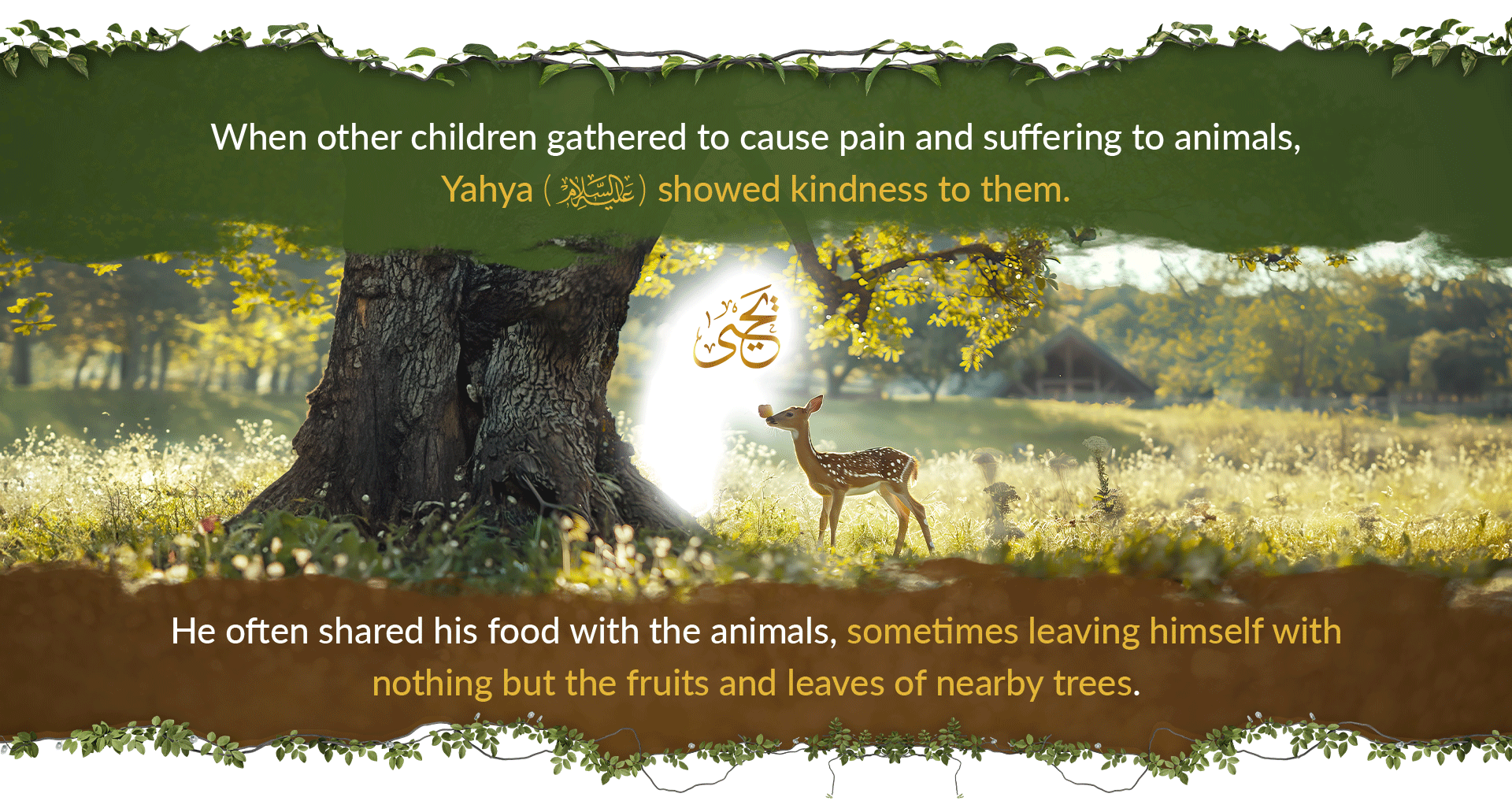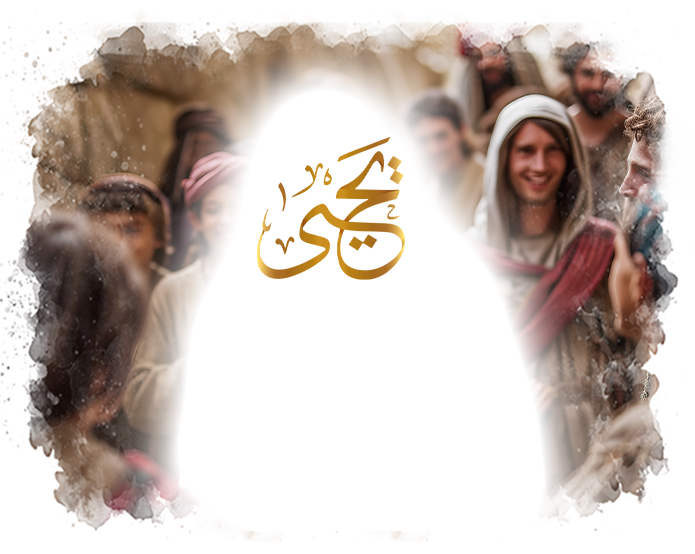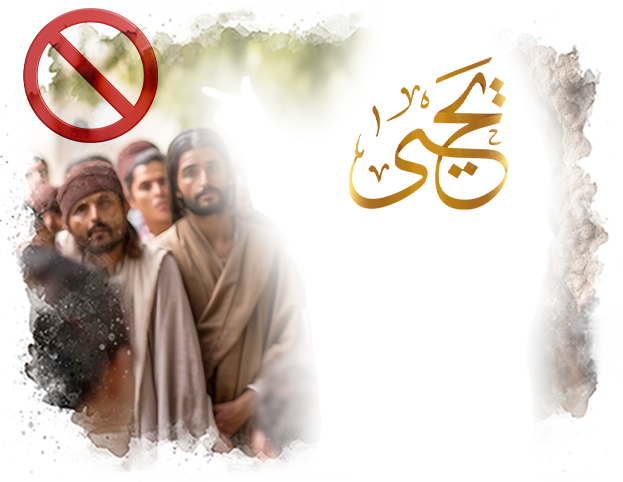When other children gathered to cause pain and suffering to animals, Yahya (عَلَيْهِ ٱلسَّلَامُ) showed kindness to them.
He often shared his food with the animals, sometimes leaving himself with nothing but the fruits and leaves of nearby trees.

The Story of Prophet Al-Yahya (عَلَيْهِ ٱلسَّلَامُ)
A Miraculous Birth
Prophet Yahya (عَلَيْهِ ٱلسَّلَامُ) is known as John the Baptist in Judeo-Christian tradition.

The birth of Prophet Yahya (عَلَيْهِ ٱلسَّلَامُ) can be considered a miracle as Prophet Zakariyah’s (عَلَيْهِ ٱلسَّلَامُ) wife was believed to be barren and was past childbearing age when the couple was blessed with him.
The name Yahya was given to the newborn by Allah (سُبْحَٰنَهُۥ وَتَعَٰلَىٰ) — a name that was not used by any other before.
Allah (سُبْحَٰنَهُۥ وَتَعَٰلَىٰ) says in the Holy Quran:
English Translation:
"Zechariah, We bring you the good news of the birth of a son whose name shall be Yahya (John), one whose namesake We never created before."
— Surah Maryam, ayah 7

His early life and character
Prophet Yahya (عَلَيْهِ ٱلسَّلَامُ) was unlike other children his age; when they preferred to play during their leisure time, Prophet Yahya (عَلَيْهِ ٱلسَّلَامُ) busied himself with activities that expanded his knowledge.

"O Yahya! Hold the scripture with all your strength."
— (Surah Maryam, ayah 12)
The same verse reveals that Prophet Yahya (may peace be upon him) was given Hukm, meaning wisdom, knowledge, and good judgment to discern as an authority on the scripture.
The ayah further states that
"We had bestowed wisdom upon him while he was still a child;"
The scripture referenced in this verse was the Torah, originally given to Prophet Musa (عَلَيْهِ ٱلسَّلَامُ). From a young age, Yahya (عَلَيْهِ ٱلسَّلَامُ) was instructed to deeply understand, believe in, and act upon these religious texts. His precocious spiritual understanding set him apart from the other children. He showed a lack of interest in their games and lived a life devoted to his spiritual studies.
With the gift of knowledge granted to him, Yahya (عَلَيْهِ ٱلسَّلَامُ) became the wisest and most knowledgeable man of his time. His innate sensitivity and empathy deepened with age, and it led him to show even greater compassion towards his parents, community, and all of Allah's (سُبْحَٰنَهُۥ وَتَعَٰلَىٰ) creation.

Allah (سُبْحَٰنَهُۥ وَتَعَٰلَىٰ) says in Surah Maryam that Prophet Yahya (عَلَيْهِ ٱلسَّلَامُ) was bestowed with purity and compassion.
The Almighty also states that by His will, Yahya (عَلَيْهِ ٱلسَّلَامُ) attained piety and compassion towards his parents.
English Translation:
"We also endowed him with tenderness and purity, and he was exceedingly pious. and cherishing to his parents. Never was he insolent or rebellious. Peace be upon him the day he was born, and the day he will die, and the day he will be raised up alive"
— Surah Maryam, ayat 13-15
The scholars interpret the word "Hanan" as tenderness, an innate quality likened to a mother's love, characterized by intense gentleness, mercy, and compassion. This kind of empathy is a divine gift by Allah (سُبْحَٰنَهُۥ وَتَعَٰلَىٰ) instilled in one's heart.
Next, it mentions his purity, referring to the state of either being absolved from sin or his righteousness in deeds (having sincere niyyah). Prophet Yahya (عَلَيْهِ ٱلسَّلَامُ) also embodied taqwa and humility. He was never arrogant to disobey Allah (سُبْحَٰنَهُۥ وَتَعَٰلَىٰ) commands and was always dutiful to his parents.
With this, Allah (سُبْحَٰنَهُۥ وَتَعَٰلَىٰ) allowed Yahya (عَلَيْهِ ٱلسَّلَامُ) to counsel people on various matters, warn them against disobedience and disbelief, urge them to repent for their sins, and guide them to the religion of truth.

Prophet Yahya (عَلَيْهِ ٱلسَّلَامُ) Love of Nature

Prophet Yahya (عَلَيْهِ ٱلسَّلَامُ) was a humble servant of Allah (سُبْحَٰنَهُۥ وَتَعَٰلَىٰ) who found peace and solace in nature.
He often slept in mountains, fields, caves, or holes in the ground. His nights were spent crying and praising Allah (سُبْحَٰنَهُۥ وَتَعَٰلَىٰ) for His countless blessings.
He even had a couple of run-ins with wild lions and bears, but he never heeded them, being deeply immersed in praising his Lord.
The wild animals recognized Yahya (عَلَيْهِ ٱلسَّلَامُ) as the Prophet who cared for all creatures, so they would leave bowing their heads with respect.

There are also stories reported of Prophet Yahya (عَلَيْهِ ٱلسَّلَامُ), which show his sensitive heart and sincere devotion. It was said he used to cry so much that the tears marked his cheeks. One day, after not having seen his son for three days, Prophet Zakariyah (عَلَيْهِ ٱلسَّلَامُ) went in search of him. He eventually found his son resting inside a grave which he had dug himself.
Prophet Zakariyah (عَلَيْهِ ٱلسَّلَامُ) said:
"My son, I have been looking for you, and you are dwelling in this grave weeping!"
Yahya (عَلَيْهِ ٱلسَّلَامُ) replied:
"O father, did you not tell me that between Paradise and Hell is only a span, and it will not be crossed except by tears of weepers?"
"Weep then, my son," Prophet Zakariyah (عَلَيْهِ ٱلسَّلَامُ) said as they wept together.

In another heartfelt account, Prophet Yahya (عَلَيْهِ ٱلسَّلَامُ) was said to be sitting alone at the Jordan River, overlooking the water, crying in devotion to Allah (سُبْحَٰنَهُۥ وَتَعَٰلَىٰ).

Unnoticed, his parents, who had been searching for him, quietly approached. Overwhelmed by his devotion to Allah (سُبْحَٰنَهُۥ وَتَعَٰلَىٰ), they, too, were moved to tears.
This instance highlights a common theme throughout his life: his words were so moving that the people had no reservations about the veracity of the message he was delivering. Whenever Prophet Yahya (عَلَيْهِ ٱلسَّلَامُ) called out to his folk to worship Allah (سُبْحَٰنَهُۥ وَتَعَٰلَىٰ), he made them weep in their love and reverence for the Almighty.
It was narrated that Prophet Yahya (عَلَيْهِ ٱلسَّلَامُ) once said:
"The dwellers of Paradise are sleepless out of the sweetness of Allah's bounty; That is why the faithful must be sleepless because of Allah's love in their hearts. How far between the two luxuries, how far between them?"
Allah (سُبْحَٰنَهُۥ وَتَعَٰلَىٰ) speaks of Prophet Yahya (عَلَيْهِ ٱلسَّلَامُ) in the Quran:
English Translation:
"...shall be outstanding among men, utterly chaste, and a Prophet from among the righteous."
— Surah Al-Imran, ayah 39
Scholars state that Prophet Yahya (عَلَيْهِ ٱلسَّلَامُ) was devoted to Allah (سُبْحَٰنَهُۥ وَتَعَٰلَىٰ) to such an extent that he remained chaste till his final breath. They further state that while this is an accepted act of worship during the time of Prophet Yahya (عَلَيْهِ ٱلسَّلَامُ), it is encouraged for Muslims to marry, as per the sunnah of Prophet Muhammad (ﷺ).
A chain of narrators reported Idris Al Khawlawi said:
“Shall I tell you who ate the best food?”
He then continued:
“It is Yahya Ibn Zakariyah. He ate with the company of animals at dinner, because he feared mixing with people."
Prophet Yahya (عَلَيْهِ ٱلسَّلَامُ), who was extremely disciplined and lived a purposeful life in solitude having enough with just his relationship with Allah (سُبْحَٰنَهُۥ وَتَعَٰلَىٰ).

Prophet Yahya (عَلَيْهِ ٱلسَّلَامُ) relationship with Prophet Isa (عَلَيْهِ ٱلسَّلَامُ):
In Islamic tradition, Mary and Jesus are known as Maryam (may Allah be pleased with her) and Isa (عَلَيْهِ ٱلسَّلَامُ), respectively.

The view of many biographers and historians is that the mother of Maryam and the mother of Prophet Yahya were sisters.
This would make Prophet Isa (عَلَيْهِ ٱلسَّلَامُ) and Prophet Yahya (عَلَيْهِ ٱلسَّلَامُ) maternal cousins.
Isa (عَلَيْهِ ٱلسَّلَامُ) made the supplication,
“Indeed, I am the servant of Allah. He has given me the Scripture and made me a prophet. And He has made me blessed wherever I am and has enjoined upon me prayer and zakah as long as I remain alive And [made me] dutiful to my mother, and He has not made me a wretched tyrant. And peace is on me the day I was born and the day I will die and the day I am raised alive.”
— (Surah Maryam, ayat 30-33)
The Quranic verses concerning Prophet Isa's (عَلَيْهِ ٱلسَّلَامُ) character share similarities with those about Prophet Yahya (عَلَيْهِ ٱلسَّلَامُ), particularly in verses 12-15, where Allah (سُبْحَٰنَهُۥ وَتَعَٰلَىٰ) speaks of Yahya's virtues.
The difference, however, is in these verses Prophet Isa (عَلَيْهِ ٱلسَّلَامُ) speaks in first person saying how he is, "dutiful to my mother" instead of saying parents since he was born without a father.
Both Prophet Yahya (عَلَيْهِ ٱلسَّلَامُ) and Prophet Isa (عَلَيْهِ ٱلسَّلَامُ) mention the triple blessing of peace — a divine protection placed by Allah (سُبْحَٰنَهُۥ وَتَعَٰلَىٰ) at their birth, death, and resurrection.
The scholars interpret these blessings as follows:
peace at birth referring to the protection placed from the influence of Shaitan and his evil, peace at death indicating being exempt from the trials of the grave, and peace at resurrection as being free from the fear and worry that will overcome others on that day.

Prophet Muhammad (ﷺ) meets Prophet Yahya (عَلَيْهِ ٱلسَّلَامُ):
During Prophet Muhammad’s (ﷺ) night journey and ascension to the heavens, he met his brothers, Prophet Yahya (عَلَيْهِ ٱلسَّلَامُ) and Prophet Isa (عَلَيْهِ ٱلسَّلَامُ).
In the famous hadith known as, "Hadith of Isra and Mi'raj" in Sahih Bukhari 3207, it mentions,
"…Then we ascended to the second heaven. It was asked, 'Who is it?' Jibreel said, Jibreel.' It was said, 'Who is with you?' He said, 'Muhammad' It was asked, 'Has he been sent for?' He said, 'Yes.' It was said, 'He is welcomed. What a wonderful visit his is!"
Then I met Jesus and Yahya (John) who said,'You are welcomed, O brother and a Prophet.'"
After this encounter, Prophet Muhammad (ﷺ) continues to ascend through the heavens, meeting various other prophets, including Yusuf in the third, Idris in the fourth, Harun in the fifth, Musa in the sixth, and Ibrahim in the seventh.
It is here where the fifty daily prayers were initially obligated, but after a series of discussions with Prophet Musa (عَلَيْهِ ٱلسَّلَامُ) and subsequent pleas to Allah (سُبْحَٰنَهُۥ وَتَعَٰلَىٰ), the obligation was reduced to the five daily prayers.

Prophet Yahya (عَلَيْهِ ٱلسَّلَامُ) untimely death:
The Ruler of Palestine Herod Antipas, a tyrant king, planned to marry his niece Salome with whom he was in love. Salome’s mother and some learned men of Zion openly encouraged the marriage.
Prophet Yahya (عَلَيْهِ ٱلسَّلَامُ) who got wind of the impending marriage, publicly condemned the proposed marriage as incestuous, violating the holy Torah's laws.

Salome, eager to ascend to power and rule alongside her uncle, devised a plan. She dressed attractively and enticed Herod with a provocative dance. She captivated him, leading him to promise her any wish.

Seizing the moment, Salome demanded Yahya's head,
“I would love to have the head of Yahya because he has defiled your honor and mine throughout the land. If you grant me this wish, I shall be very happy and will offer myself to you.”
Herod, spellbound by Salome, complied. Prophet Yahya (عَلَيْهِ ٱلسَّلَامُ) was captured and executed, and his head was taken to a delighted Queen.
